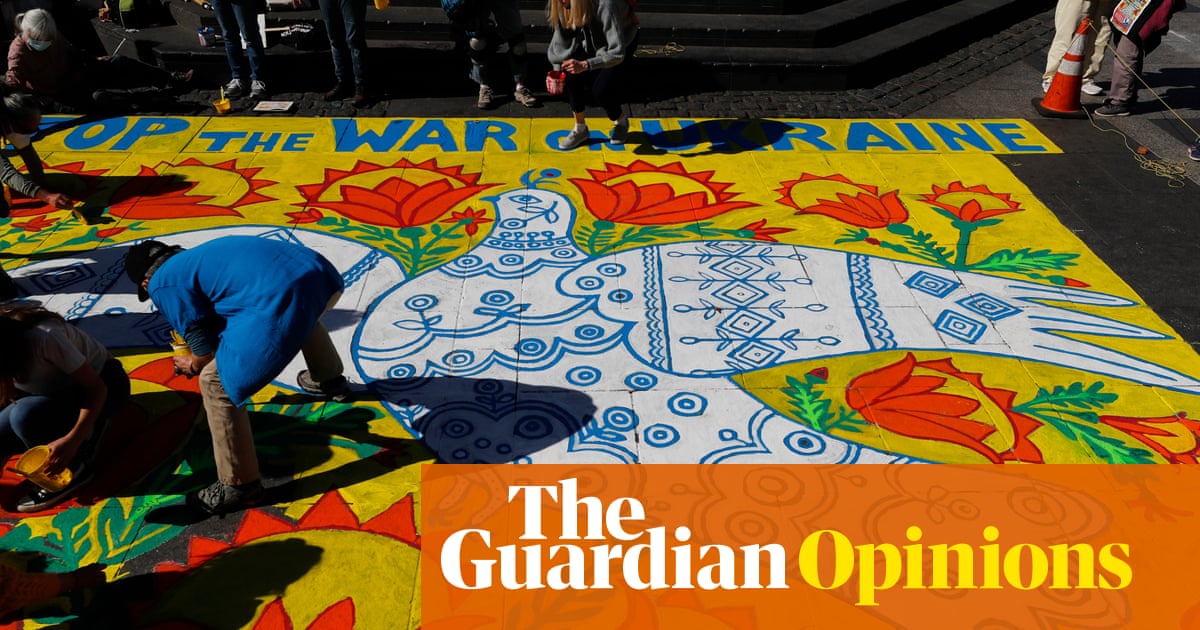The Guardian view on Ukraine’s cultural heritage: a second front
Show caption Protesters in San Francisco recreate A Dove Has Spread Her Wings and Asks for Peace by the Ukrainian artist Maria Prymachenko. Photograph: John G Mabanglo/EPA Opinion The Guardian view on Ukraine’s cultural heritage: a second front Editorial Vladimir Putin’s war against Ukraine is not just about territory. It’s about who owns a nation’s story Thu 10 Mar 2022 19.00 GMT Share on Facebook
Share on Twitter
Share via Email
Culture has long been a proxy in the assertion of power by one people over another. Recent egregious examples include the Chinese government’s attempt to suppress Uyghur religion, literature, music, even food, and Islamic State’s destruction of ancient monuments. In war, culture is a second front. At their most extreme, wars are about eradicating a people’s cultural memory altogether, wiping them from the slate as if they had never been.
That Vladimir Putin should have prefaced his invasion with a speech falsely framing Ukraine as essentially Russian is on the one hand a spurious justification for invasion, and on the other an attempt to seize, simplify and own a complex historical narrative about the two intertwined but distinct nations.
However, Mr Putin has been outsmarted by his Ukrainian counterpart, Volodymyr Zelenskiy. The former comedian, who had never held office before his 2019 election, has, remarkably, been a persuasive rhetorician and war leader. On the other hand, a career in acting is perhaps exactly what was required for him to step so convincingly into this new role.
He is not the only one to make such a leap. A potent symbol of the ploughshares-to-swords shift of Ukraine is the fact that ballet dancers from Kyiv’s national opera house have joined the fight. Elsewhere, symbols of Ukrainian resistance – the sunflower, and the blue and yellow of the national flag – have been deployed internationally to moving effect. And acts of fellowship – making Ukrainian food, for example, as part of the UK-based Cook for Ukraine humanitarian fundraising effort – have their own simple and practical power.
“If we lose our culture, we lose our identity,” Lilya Onyshchenko, the head of Lviv’s city council heritage protection office, told the Guardian. Ms Onyshchenko went on to emphasise that the city in western Ukraine had always been multicultural. It is not clear what Mr Putin’s intentions are, precisely, in relation to Ukraine’s assertion of its own identity. But the understandable fear is that Russian expansion seeks to colonise minds as well as places.
In some ways, intentions are less important than effects, amid war’s messy reality. A missile strike in Kyiv that reportedly killed five people was seemingly directed at the television tower, but it lies close to Babyn Yar, the site of the massacre of 150,000 people during the second world war, including 30,000 Jews – a great irony given Mr Putin’s stated ambition to “denazify” Ukraine. An attack on the town of Ivankiv, 50 miles north-west of Kyiv, set afire the town’s Historical and Local History Museum, destroying precious works by the 20th-century folk artist Maria Prymachenko. The artist is an important symbol of Ukrainian art – and Ukrainian hope.
Three decades ago, war in the former Yugoslavia saw sacred and beautiful places such as Dubrovnik or the Mostar bridge and old town targeted, sometimes with the intention of erasing the evidence that people of another religion or ethnicity had once lived there. Whether or not sites like Babyn Yar and Ivankiv’s museum have been collateral damage rather than actual targets, the cultural front in war is never trivial. This is a conflict, like so many others, that’s not just about controlling territory – but owning narrative.
{{topLeft}} {{bottomLeft}} {{topRight}} {{bottomRight}} {{/goalExceededMarkerPercentage}} {{#goalExceededMarkerPercentage}}{{/goalExceededMarkerPercentage}} {{heading}} {{#paragraphs}} {{#ticker}}{{/ticker}}{{#paragraphs}} {{.}} {{/paragraphs}} {{highlightedText}}
{{#choiceCards}}
Single Monthly Annual
Other {{#cta}} {{text}} {{/cta}} Email address Please enter a valid email address Please enter your email address Set a reminder Sorry we couldn’t set a reminder for you this time. Please try again later. . To find out what personal data we collect and how we use it, view our We will send you a maximum of two emails in. To find out what personal data we collect and how we use it, view our Privacy Policy . If you have any questions about contributing, please We will be in touch to remind you to contribute. Look out for a message in your inbox in. If you have any questions about contributing, please contact us {{/paragraphs}}{{#choiceCards}}{{/choiceCards}}













